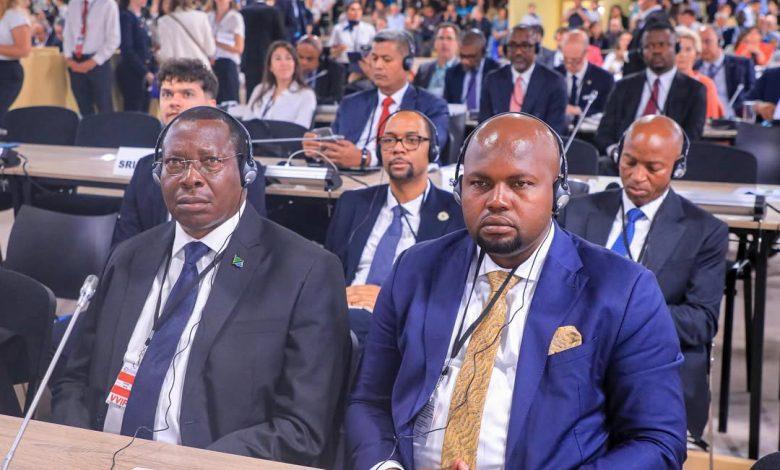Africa-Press – Tanzania. THE Vice-President Dr Philip Mpango, has called for immediate, decisive and coordinated international efforts to protect and preserve the world’s oceans.
Speaking on behalf of President Samia Suluhu Hassan at the Third United Nations Ocean Conference (UNOC3) in Nice, France, yesterday, Dr Mpango stressed the necessity of international cooperation, sustained investment and inclusive partnerships to tackle the growing threats facing marine ecosystems.
“There must be bold and coordinated measures, efficiently organised to achieve tangible progress in ocean sustainability,” he said.
He drew attention to the critical need for increased global financial support, particularly for lowincome countries and Small Island Developing States, which grapple with limited fiscal resources and heavy debt burdens factors that impede their ability to meet Sustainable Development Goal 14 (SDG 14) on life below water.
Addressing an audience of heads of state, government representatives, international organisations, civil society groups and business leaders, Dr Mpango spoke under the conference theme: “Accelerating action and mobilising all actors to conserve and sustainably use the ocean.”
Warning that oceans often referred to as the planet’s lifeline are now “under siege,” he identified climate change, biodiversity loss and pollution as the principal threats to marine life and coastal communities.
With over 1,424 kilometres of coastline and an Exclusive Economic Zone surpassing 64,000 square kilometres, Tanzania’s economy and livelihoods are closely connected to the ocean.
“Approximately 25 per cent of our population depend on the ocean for their livelihoods,” he noted.
“The health of marine ecosystems is therefore vital to our development and national prosperity.”
To confront these challenges, Dr Mpango outlined Tanzania’s key strategies, including the expansion of Marine Protected Areas, aiming to cover at least 20 per cent of territorial waters by 2030. These zones play a crucial role in conserving coral reefs, seagrasses, mangroves and restoring fish stocks.
The country has also adopted community-driven conservation efforts, with co-management approaches involving artisanal fishers, women and youths. These initiatives have fostered stronger local stewardship, improved compliance and greater resilience in coastal regions.
Other measures include broadening access to microcredit for coastal communities and encouraging alternative livelihoods such as seaweed farming, octopus and crab cultivation and fish processing.
On the regulatory side, Tanzania has increased enforcement against illegal, unreported and unregulated (IUU) fishing. Investments are also being made in marine spatial planning and data-based resource management.
“We have developed a National Blue Economy Strategy outlining a roadmap to build marine infrastructure, attract investment, encourage innovation and ensure environmental sustainability,” he added.
Dr Mpango underlined that no nation can tackle ocean threats alone.
“The challenges facing our oceans cross national boundaries. Collective action, global solidarity and long-term investment are essential to safeguard their health and productivity,” he said.
He urged the full implementation of the High Seas Treaty (BBNJ) and called for legally binding agreements to address marine plastic pollution.
He also supported stronger links between science and policy, enhanced technology transfer and the inclusion of traditional and indigenous knowledge in ocean conservation.
“It is crucial that coastal communities are not left behind,” he stated, adding; “We must build inclusive and equitable partnerships that empower these communities to take a central role in protecting the ocean and finding sustainable solutions.”
Dr Mpango urged participants to treat the conference as a pivotal moment: “Let this gathering serve not only as an opportunity to review progress but as a launchpad for genuine commitment.”
“Tanzania is ready to work alongside governments, the private sector, NGOs and civil society to create a future where oceans remain resilient, productive and integral to sustainable development,” he affirmed.
“We must act now for our people, our planet and generations to come.”
For More News And Analysis About Tanzania Follow Africa-Press







